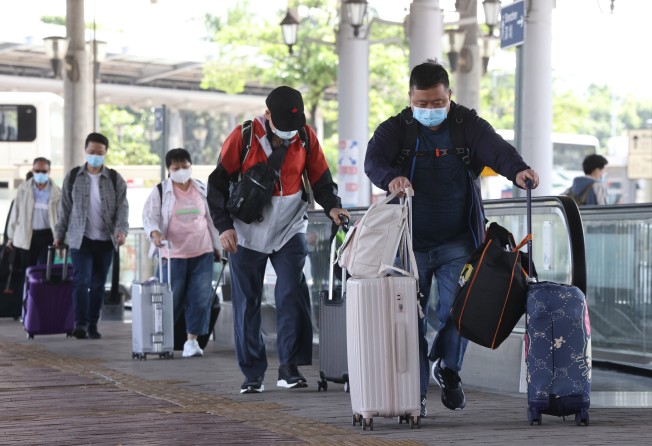Is Hong Kong paying too high a price for a limited border reopening?
- Readers discuss efforts to reopen the border with the mainland, vaccinations for children, the Omicron variant and improvements to the leisure facility booking system

The people of Hong Kong seem to be paying too high a price for limited quarantine-free travel to the mainland that is currently being planned with the central government. This is hardly a reopening of the border with China.
If a similar arrangement with Macau is any example, the arrangement with Hong Kong is liable to be suspended at the drop of a hat if a single case of Covid-19 appears in Hong Kong. The virus is seen by many as being endemic, which means cases are inevitable now and in the future.
How does this ever lead to a reopening of Hong Kong’s borders with the rest of the world? It is simply not feasible to have a border reopening that is liable to be suspended without adequate prior notice for such a flimsy cause. Travellers have to make plans, book flights, arrange meetings and so on in the certainty that the reopening can be implemented except in the event of a serious emergency.
Hong Kong owes it to its people to reopen international borders as soon as possible. It is essential for the economic well-being of Hong Kong, not least for our tourism, travel and hospitality industries. It is equally essential on humanitarian grounds to reunify families who have been torn asunder by Hong Kong’s heartless policies.
The government should not hide behind the excuse of low vaccination rates. First-dose vaccination rates of 45 per cent for people in their 70s and 18 per cent for people in their 80s represent a failing on the part of the government itself.
The government has a duty to get out into local communities to lead a drive to impress upon older people the need to be vaccinated for their own welfare, as well as that of the people of Hong Kong.
James Watkins, Mid-Levels
Prioritise vaccinating adults over children
I am writing in response to “Coronavirus: Hong Kong children as young as 3 to get access to Sinovac jab” (November 20). Since the effects of Covid-19 vaccination on kids are not fully known, the risk might not be worth taking.
Also, Hong Kong has averaged fewer than 10 new cases every day since May. Although prevention is better than cure, the risk might not be worth the reward.
Furthermore, vaccines will be more valuable when they are given to the adults in countries that are still struggling with Covid-19. Resources are limited. A child being vaccinated means one fewer adult can be vaccinated. Because the effects of jabs on adults are more well-known, it is a safe play to choose adults over children.
Chan Nga Yan, Tseung Kwan O
Hong Kong fortunate to have quarantine programme
Given that a new Covid-19 variant is spreading, I now feel Hong Kong’s approach to quarantine is acceptable. Thankfully, the city is keeping everybody safe by having a mandatory quarantine rule.
This could eventually become a norm for the longer term because as a human race we haven’t effectively eliminated the virus. We have only built a vaccine that helps us fight it.
Rishi Teckchandani, Mid-Levels
Make good on promise of Leisure Link improvements
To facilitate the booking of sports venues, the Leisure and Cultural Services Department has been using Leisure Link, an electronic platform that lets registered users log in and make a reservation. Although the system has been in use for two decades, it only has about 350,000 registered users with 34 per cent of them active in the past 12 months.
To assess platform usage, we requested data from the department about how users made their bookings for four sports centres from January to June this year. Among the 80,000 reservations, more than 40 per cent were made in person despite the convenience of online booking.
To attract more users to book a venue online, the department should adopt iAMSmart, an online authentication tool developed by the Office of the Government Chief Information Officer. Users can then make a booking by logging in with iAMSmart without registering for a Leisure Link account. Since its launch in December 2020, dozens of government departments and offices have deployed iAMSmart for users to verify their identities.
According to a tender document dated November 2020, the government planned to roll out the iAMSmart upgrade for Leisure Link in July this year. In response to our inquiry, however, the department said the document was a tentative work schedule for internal use only and would not specify when the iAMSmart feature would be available for Leisure Link users.
Since Leisure Link mainly operates on web browsers, we believe an app should be developed so people can reserve venues using their smartphones. However, the department says the Leisure Link system cannot be adapted into an app and that it plans to develop a new system with mobile apps to offer more customer-friendly booking services.
This new system was promised in the 2017 Policy Address by the chief executive. Yet, the department still has yet to make public its timeline for developing it.
We do not understand why the government would spend money upgrading the 20-year-old Leisure Link system with iAMSmart but fail to develop a concrete plan for building the new system that was promised in 2017. We urge the government to ensure the community will be served with state-of-the-art technology for venue booking as soon as possible.
Zirui Yang and Zihan Zhang, Kowloon Tong